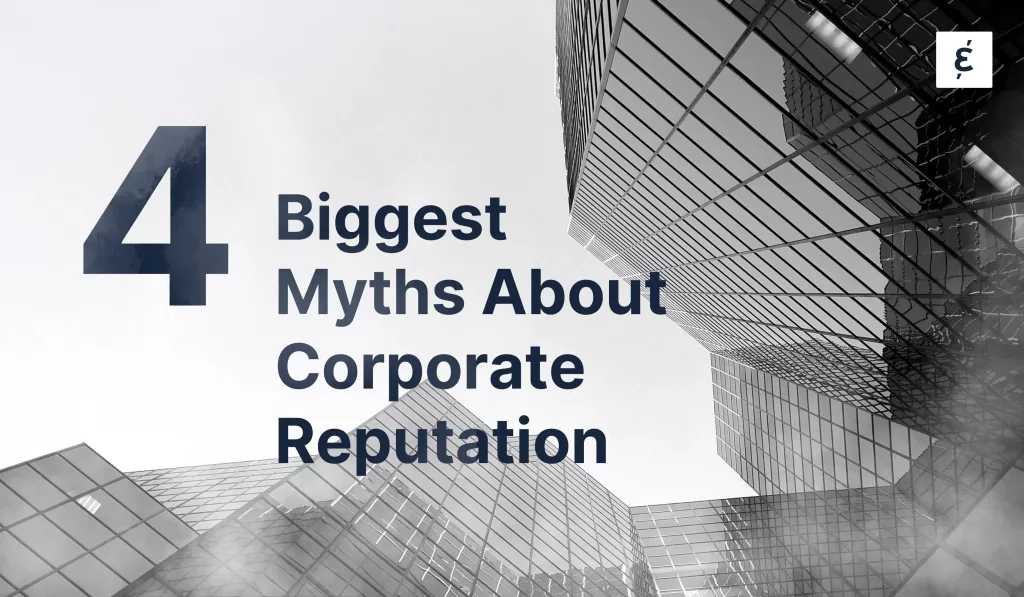

Corporate reputation is a slippery fish – and measuring it’s like trying to nail jelly to the wall.
That’s just one of a few myths about corporate reputation that we need to debunk.
Not only because they’re wrong but because reputation plays a crucial role in a company’s success or failure – and companies that fail to measure and monitor theirs do so at their peril.
Here, then, are the four biggest myths about corporate reputation – and why they’re wrong.

The “slippery fish” argument. Reputation’s hard to pin down and impossible to quantify, right? Wrong. On a basic level, the right Google search will give you a sense of what people think of your company, as will your net promoter score. Then there are media monitoring and social listening tools, though they paint an incomplete picture of corporate reputation.
Increasingly, for forward-thinking companies, the solution is to measure their brand and reputation using stakeholder intelligence tools such as Caliber’s Real-Time Tracker.
Measuring – and monitoring – corporate reputation in real time is vital because stakeholder perceptions aren’t fixed. Reputations aren’t static. They can easily change in response to unpredictable external events or internal decisions with unanticipated consequences.
Caliber’s chief metric is the Trust & Like Score. It quantifies the extent to which stakeholders trust a company and like it.
We also measure a dozen other brand and reputation attributes, from Leadership to Innovation and Authenticity to Differentiation. We also measure the likelihood of certain stakeholder behavior – such as supporting a company, recommending its products or services, or considering applying for a job at the company.
And here’s the kicker. All these scores can be “sliced and diced” into different – and potentially customized – segments of the stakeholder universe. Think men, women, Gen-Z, Millennials, Republicans, Democrats, level of education, engineers, journalists, regulators, etc.
These scores paint a complete picture of what a company’s stakeholders think of it – over time and at any given moment. These scores also appear on a visually appealing, user-friendly dashboard. That allows different teams at a company (comms, HR, marketing) to follow relevant metrics, set their KPIs, and benchmark their performance.

This myth goes a little like this: “You may be able to measure reputation, but it doesn’t count for much.” Or: “At the end of the day, the only metric that matters is the share price.” Or: “The only numbers worth worrying about are the ones in the profit and loss statement.”
Well, up to a point. You see, far from being a fluffy distraction from the serious business of making money, corporate reputation has a big role in its production. The myth that it’s an irrelevant sideshow without bearing on the bottom line is false.
Simply put, a good reputation elevates your business. It fosters investor confidence and consumer trust. In other words, with a good reputation, people are more likely to invest in and buy from you. And greater financial success is inevitable if it’s easier to attract investment and win and retain customers.
The flip side is also true, of course. While a strong reputation can boost revenue and drive up your share price, a poor reputation can drive it down and lead to reduced revenue.
The logic applies to the war for talent, too. A strong reputation attracts stronger job candidates – and helps companies retain valuable employees. Three-quarters of people want to work for a company with a good reputation – and almost a third of job seekers would reject an offer from a company with a bad reputation, even if offered a 100% pay rise.
In other words, a company’s reputation reflects its values, work culture and public image – and plays a vital role in attracting and retaining talent – while a bad reputation repels job candidates, affects morale and drives good employees away.
This may be an easy argument, but it’s backed by research. Several studies have shown a relationship between reputation, financial performance and market value.
According to one study – a 2004 assessment of historical data – companies with good reputations outperformed those with poor ones on every financial measure over five years. Another study from the same year reckons reputation contributes between 3% and 7.5% of annual revenues and should be considered an investment, not a cost.
Reputation, in other words, isn’t simply something you can measure; it reveals the true value of your business. The apparent links between reputation and financial performance may also explain why so-called intangible assets count for an ever-larger proportion of companies’ market value, rising from 17% in 1975 to 90% in 2020.

This myth betrays a kind of corporate myopia. It stems from the belief that we’re all in the market for whatever the company sells. If only it were that simple.
Corporate reputation derives, in fact, from a much larger universe of stakeholders, one that includes consumers, investors, employees, journalists, opinion leaders, regulators and more.
Yes, these categories overlap – and for some companies, everyone is a potential customer. But people choose different hats for different occasions – depending on what they’re wearing, they’ll perceive your company accordingly. And a brand tracker will tell you only what consumers and customers think of your brand – meaning it’s accurate but limited.
At best, brand trackers tell you how and why people buy and use your products. But corporate reputation is so much more than that. It derives not only from the perceptions of a much larger universe of stakeholders but from a broader range of factors, too. These include how you treat your employees, how ethically you do business, how authentic, relevant and innovative you seem, and whether you positively impact people and the planet.
There’s also a wealth of evidence that consumers are attracted to companies that support environmental and social causes. Almost 90% of consumers have a more positive view of companies that support social and environmental causes. A similar percentage of people will buy a product from a company that advocates for an issue they care about. And two-thirds of us will pay more to support businesses committed to corporate social responsibility.
Which is why, to understand the actual value of their brand and reputation, companies need to measure and monitor their entire stakeholder universe. By “slicing and dicing” this universe, first into different categories, then into even narrower (if not customized) segments, they can better understand how each of these discrete groups of stakeholders perceive their business.
And that makes it much easier to develop specific marketing or communications strategies for each group, tailormade to help maintain or improve their reputation. After all, what matters to one group – brand consumers, say – may not matter to another – like relevant talent, policy-makers or NGOs. Getting it wrong could be counterproductive – if not costly.

A staggering 87% of executives believe their company’s reputation is strong. They can’t all be right. Our dashboard, which reveals the reputation of thousands of companies, suggests many executives are in cloud cuckoo land. Their companies’ reputations are far from robust.
And that’s not all that’s wrong with this myth. The real problem is it fails to consider the world we live in – the world in which companies now have to manage their reputations. This is the world of the polycrisis, where reputational risks are omnipresent and omnidirectional. In plain English, you never know when the proverbial will hit the fan.
We’ve discussed those reputational risks elsewhere – and they keep arising. In recent months, major companies have faced reputational threats as diverse as industrial action, a consumer backlash and a disgruntled (or lazy) employee answering nature’s call. The point is reputation isn’t guaranteed. Indeed, it takes years to build up and seconds to knock down.
The solution for companies – whether or not they believe their reputation is robust – is eternal vigilance. Companies that track what their stakeholders think are better able to manage and mitigate reputational risks.
Not only can they see which stakeholders are most impacted by a crisis, but they can also see who their response resonates with – or not – and stick to their chosen path or change course accordingly. By contrast, companies that don’t track what their stakeholders think – and that lack benchmarks to compare perceptions to – are flying blind.
Finally, proactive reputation monitoring – ensuring your reputation is robust – before any fan-hitting moment can limit the reputational damage. That’s because most people give a company in crisis the benefit of the doubt if it has an excellent reputation. People are also more likely to support – and forgive – socially responsible companies facing a crisis.
In other words, crisis prevention is always more cost-effective than damage control. So the question is simple. Do you want to be the global executive who decided not to track stakeholder perceptions because you had a hunch your company’s reputation was “strong”?
Reputation has a crucial role in a company’s success or failure. It influences consumer choices, talent acquisition, investor confidence and market perception. It’s also vital for managing – and mitigating – a crisis. And for forward-thinking companies, it’s no longer about whether to monitor their reputation – but how to manage and leverage it for greater success.
If you want to start tracking your reputation, please contact us now.
© 2024 Group Caliber | All Rights Reserved | VAT: DK39314320